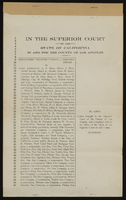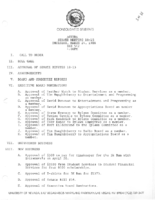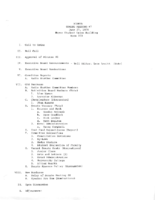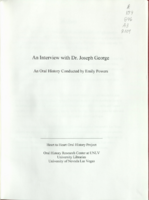Search the Special Collections and Archives Portal
Search Results

Superior Court of California summons
Date
1938-01-05
Archival Collection
Description
This folder is from "Legal Records" file of the Sadie and Hampton George Papers (MS-00434)
Text

Interview with Katie McWilliam, July 9, 2004
Date
2004-07-09
Archival Collection
Description
Narrator affiliation: Consultant for Seismological Issues
Access note: Audio temporarily sealed
Access note: Audio temporarily sealed
Text

Interview with Donald E. English, March 25, 2004
Date
2004-03-25
Archival Collection
Description
Narrator affiliation: Photographer, Las Vegas News Bureau
Text

Interview with Dorothy Jean (Whitcomb) Grier, January 3, 2005
Date
2005-01-03
Archival Collection
Description
Narrator affiliation: Secretary, Los Alamos Scientific Laboratory
Access note: No audio available
Access note: No audio available
Text

Transcript of interview with Ed Collins by Steve Smith, March 15, 1981.
Date
1981-03-15
Archival Collection
Description
On March 15, 1981, Steven L. Smith interviewed Edward A. Collins (born on March 16th, 1930, in Chicago, Illinois), at the Dunes Hotel and Country Club. Collins relocated to Nevada in 1955. The interview covers gender equality in the field of culinary arts in Las Vegas. Collins describes the changes he saw take place in culinary over the years. He also discusses Bugsy Siegel’s impact and influence on the emergence of big shows in the hotels on the Strip. Among other jobs, Collins worked as a captain in a showroom at the Frontier Hotel. He discusses Las Vegas before and after Howard Hughes and Bob Maheu appeared on the scene.
Text

Meeting minutes for Consolidated Student Senate University of Nevada, Las Vegas, March 24, 1988
Date
1988-03-24
Archival Collection
Description
Includes meeting agenda and minutes along with additional information about bylaws. CSUN Session 18 Meeting Minutes and Agendas.
Text

Meeting minutes for Consolidated Student Senate, University of Nevada, Las Vegas, June 27, 1978
Date
1978-06-27
Archival Collection
Description
Agenda and meeting minutes for the University of Nevada, Las Vegas Student Senate. CSUN Session 7 Meeting Minutes and Agendas.
Text

Meeting minutes for Consolidated Student Senate, University of Nevada, Las Vegas, January 18, 1983
Date
1983-01-18
Archival Collection
Description
Includes meeting agenda and minutes. CSUN Session 13 (Part 1) Meeting Minutes and Agendas.
Text

Transcript of interview with Dr. Joseph George Jr. by Emily Powers, April 8, 2008
Date
2008-04-08
Archival Collection
Description
Dr. Joseph George, Jr., was born, raised, and educated through high school in Sudlersville, Maryland. He describes his college career at the University of Pennsylvania and earning his MD degree at University of Maryland in Baltimore. There were only 15 students in his high school class and 114 in his medical class. After graduation and two years of country medical practice, Dr. George joined the Army in 1942 and became a flight surgeon. His duty assignments took him to Africa, England, and St. Petersburg, Florida, doing physical exams for pilots and flight crews and treating soldiers with mental problems. He was discharged in 1945 and headed for California, but describes his change of mind when the train arrived in Las Vegas for a brief stopover. Dr. George liked what he saw, a typical small western city, and decided to stay. He mentions the original hotels and hospitals and names many of the doctors he knew in the forties and fifties. He opened his family practice in an office on Fourth and Carson and later moved to a location on East Sahara. Over the next forty or so years he delivered more than 6,000 babies at various hospitals in Henderson and Las Vegas. Dr. George shares several anecdotes and stories, names a few notable Las Vegas patients, and comments on historical incidents that occurred here. He gives his opinions on changes he has seen in medical practice and the need for improved psychiatric care in the valley. He also talks about keeping in touch with former patients, high school classmates, and the members of his medical class at University of Baltimore.
Text
Pagination
Refine my results
Content Type
Creator or Contributor
Subject
Archival Collection
Digital Project
Resource Type
Year
Material Type
Place
Language
Records Classification

